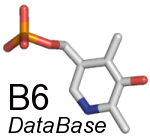|
|
| type |
Journal Article |
| authors |
Kasper SH, Bonocora RP, Wade JT, Musah RA, Cady NC |
| title |
Chemical Inhibition of Kynureninase Reduces Pseudomonas aeruginosa Quorum Sensing and Virulence Factor Expression |
| journal |
ACS Chem Biol |
| Activity |
3.7.1.3 |
| ui |
26785289 |
| year |
(2016) |
| volume |
11 |
| number |
4 |
| pages |
1106-17 |
| | |
|---|
| keywords |
DOI: 10.1021/acschembio.5b01082 |
| abstract |
The opportunistic pathogen Pseudomonas aeruginosa utilizes multiple quorum sensing (QS) pathways to coordinate an arsenal of virulence factors. We previously identified several cysteine-based compounds inspired by natural products from the plant Petiveria alliacea which are capable of antagonizing multiple QS circuits as well as reducing P. aeruginosa biofilm formation. To understand the global effects of such compounds on virulence factor production and elucidate their mechanism of action, RNA-seq transcriptomic analysis was performed on P. aeruginosa PAO1 exposed to S-phenyl-l-cysteine sulfoxide, the most potent inhibitor from the prior study. Exposure to this inhibitor down-regulated expression of several QS-regulated virulence operons (e.g., phenazine biosynthesis, type VI secretion systems). Interestingly, many genes that were differentially regulated pertain to the related metabolic pathways that yield precursors of pyochelin, tricarboxylic acid cycle intermediates, phenazines, and Pseudomonas quinolone signal (PQS). Activation of the MexT-regulon was also indicated, including the multidrug efflux pump encoded by mexEF-oprN, which has previously been shown to inhibit QS and pathogenicity. Deeper investigation of the metabolites involved in these systems revealed that S-phenyl-l-cysteine sulfoxide has structural similarity to kynurenine, a precursor of anthranilate, which is critical for P. aeruginosa virulence. By supplementing exogenous anthranilate, the QS-inhibitory effect was reversed. Finally, it was shown that S-phenyl-l-cysteine sulfoxide competitively inhibits P. aeruginosa kynureninase (KynU) activity in vitro and reduces PQS production in vivo. The kynurenine pathway has been implicated in P. aeruginosa QS and virulence factor expression; however, this is the first study to show that targeted inhibition of KynU affects P. aeruginosa gene expression and QS, suggesting a potential antivirulence strategy. |
| last changed |
2017/07/26 15:38 |
|











